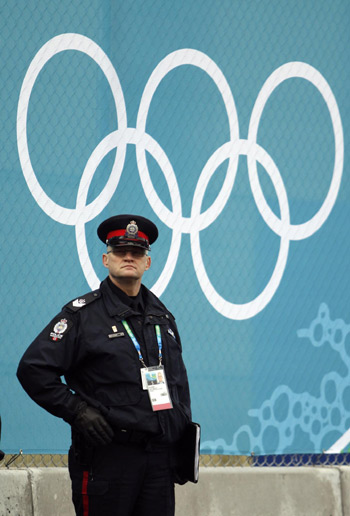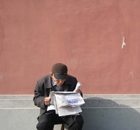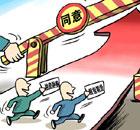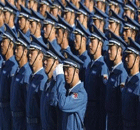About Vancouver
Vancouver in two minds about Winter Games
(Agencies)
Updated: 2010-02-02 17:11
 |
Large Medium Small |
VANCOUVER - Vancouver, host of this month's Winter Olympics, prides itself on being one of the world's most liveable cities but residents seem unsure at times whether they really want the world on their doorstep.
|
 Edmonton police Staff Sergeant Ken Hykawy arrives for a demonstration of security procedures at the Winter Olympics figure skating venue in Vancouver, British Columbia February 1, 2010. The 2010 Olympic Winter Games begin February 12. [Photo/Agencies] |
Though the Olympic buzz is building up for the Feb. 12 start of the Games, surveys have shown that doubts about the wisdom of hosting the Olympics have been higher in Vancouver, on Canada's Pacific coast, than in the rest of the country.
The Games have been at the centre of sometimes bitter political debates over issues such as free speech and spending public money on entertainment rather than social needs.
"Vancouver has a tendency to be passionate on both sides of any issue... That's just the nature of Vancouver and probably has as much to do with the make-up of our culture and city as anything," said Arthur Griffiths, one of a group of businessmen who first proposed hosting the 2010 Games.
Vancouver and its suburbs have the venues for ice hockey, curling, skating, freestyle and snowboard events, along with the opening and closing ceremonies. Alpine and Nordic skiing events, as well as bobsleigh, luge and skeleton, will be in the resort town of Whistler, some 125 km away.
Archaeologists say people have lived in the area since 500 BC but Vancouver itself is a relatively young city. It was incorporated in 1886 as the western end of the Canadian Pacific Railway and remains a key seaport link with Asia.
Some 2.1 million people live in the metropolitan Vancouver area, making it the third most populous urban area in Canada and the largest community to host a Winter Games.
Much of the population growth has come in the last 30 years as Vancouver has won acclaim in international surveys as one of the world's most liveable cities. The beauty of the natural surroundings, with both ocean and mountains, is part of the reason.
GREEN ETHOS
Less than an hour's drive from the sea-level city centre puts you in mountains where skiers who stray beyond boundaries can get lost in the rugged wilderness, and occasionally die before they are found.
Vancouver was the birthplace of Greenpeace and Olympic organisers say their pledge to keep the Games environmentally sustainable reflects the city's green ethos.
The city is a somewhat ironic choice to host an event that celebrates sports competition on ice and snow. Its winter weather is milder than the rest of Canada so it usually gets rain rather than snow, and lots of it.
The prospect of rain is a reason that this will be the first Winter Olympics to hold its opening and closing ceremonies indoors.
"We do live in a rainforest but there are three ski areas visible from downtown. Warm, wet winters do happen here -- that's why we made sure Whistler was involved," Vancouver mayor Gregor Robertson said when asked if Vancouver lacked the snowy image normally associated with a Winter Olympics.
The mild weather has caused some difficulties for final preparations for the Games, melting snow in Cypress Bowl which will host snowboard and freestyle races.
The temperate climate also contributes to one of the city's biggest problems -- homelessness. It is easier to survive outside on the streets of Vancouver in the winter than in most Canadian cities, where the cold is deadly.
Homelessness, drug abuse and other social problems are most glaring in the Downtown Eastside neighbourhood, which is located only a few blocks from venues and facilities hosting thousands of international reporters.
MARIJUANA CROP
Local critics blame the event for adding to the homeless problem by increasing real estate prices, although researchers say the data is inconclusive.
"Gentrification may have happened anyway but has definitely been speeded up by the Games," said Chris Shaw of the Olympic Resistance Network, which is planning to stage protests during the Games.
Vancouver is also sometimes called "Van Amsterdam", a reference to the role illegal marijuana plays in the community.
The pro-legalisation B.C. Marijuana Party has a downtown store, and a 2006 study put the annual value of the marijuana crop in the province of British Columbia at C$7 billion. Much of the potent "BC Bud" is exported to the United States.
Games supporters say the Olympics will be good for Vancouverites, and Vancouver will be enjoyable for both visitors and the millions of people who watch the event on television.
"I think people will appreciate what our city will show physically, but the warmth of Vancouverites and Canadians people will take away as a great memory if they have never been here before," Griffiths said.
Griffiths said Canadians' opinion of the Games might well depend on something beyond the organisers' control: whether the men's hockey team win the gold medal on the final day.
Hockey has near-religious status in Canada, which failed to win gold in any sport in its previous two home Olympics -- the 1976 Summer Games in Montreal and the 1988 Winter Games in Calgary.







